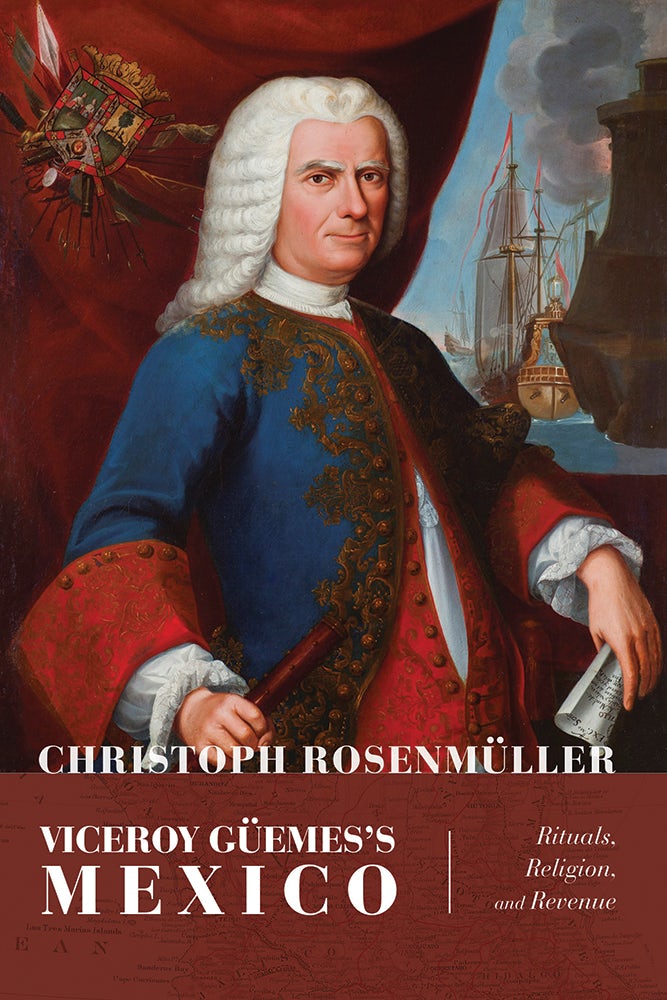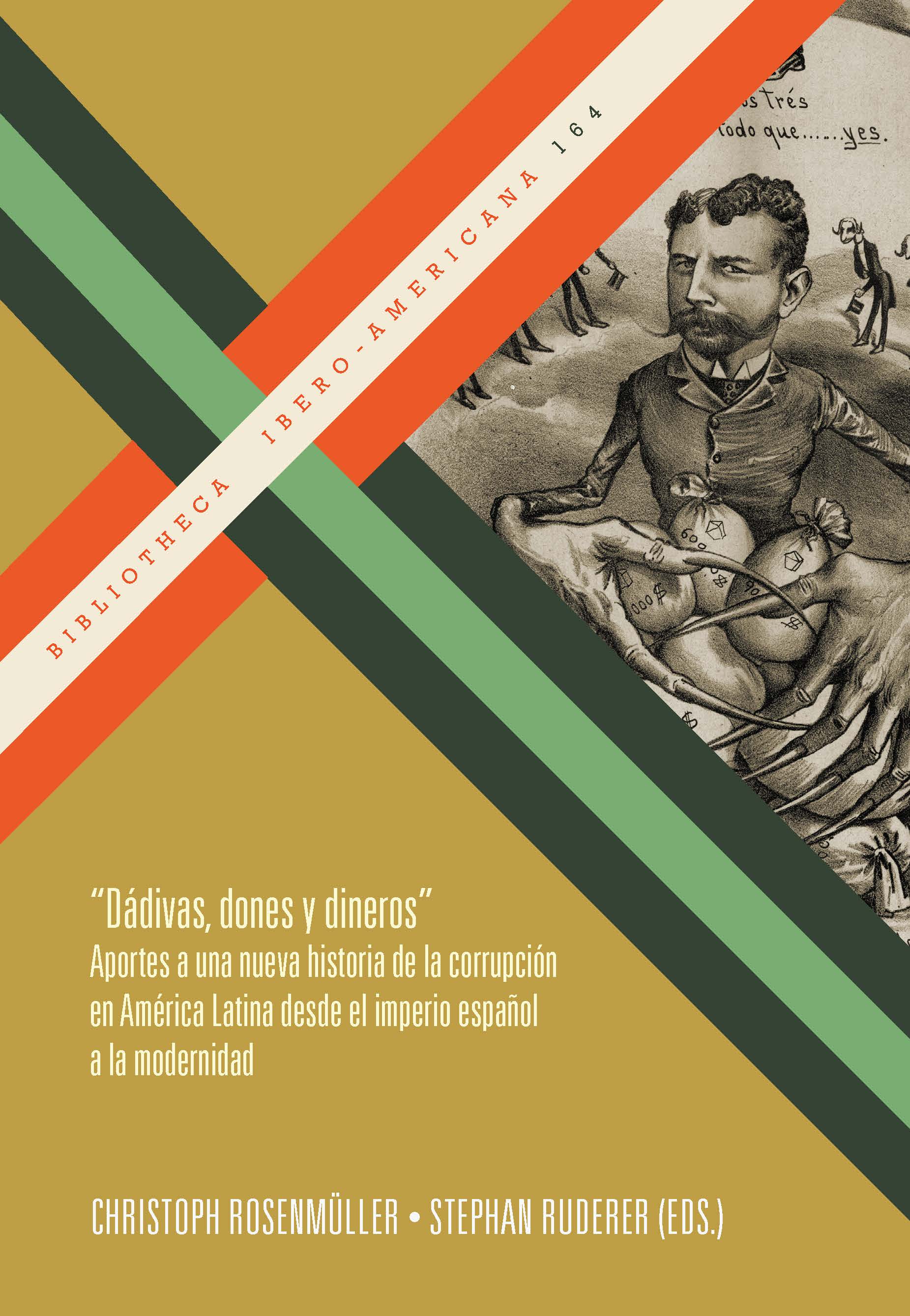Dr. Christoph Rosenmüller
Professor

Departments / Programs
Degree Information
- PHD, Tulane University (2003)
- MA, University of Hamburg (1998)
Areas of Expertise
Latin American and Atlantic History. Legal History. Teaching Experience in U.S., European, and World History
Biography
I am a historian of Latin America, and I am primarily interested in colonial Mexico within the Atlantic World. I am currently starting a new book project called “Indigenous Lawsuits of Colonial Mexico in a Global Perspective.” Natives frequently sued Spanish officials for demanding unjust labor services or forcing them to buy undesirable goods. Historians have usually read these court records as ethnographic evidence of local practices. This approach remains important, but the law...
Read More »I am a historian of Latin America, and I am primarily interested in colonial Mexico within the Atlantic World. I am currently starting a new book project called “Indigenous Lawsuits of Colonial Mexico in a Global Perspective.” Natives frequently sued Spanish officials for demanding unjust labor services or forcing them to buy undesirable goods. Historians have usually read these court records as ethnographic evidence of local practices. This approach remains important, but the lawsuits also reveal legal strategies designed to convince the judges. To understand the strategies, we have to comprehend early modern judicial culture, which included customs, royal law, and the concepts rooted in the medieval Church and the classical Roman law. The canon and Roman laws and their legal interpretations written in Latin circulated globally among the empires and connected Mexico to Europe, Asia, and Africa. My aim is to scrutinize the Native lawsuits for the interdependence of global legal content and local customs. This approach clears a path to uncover Native ideas about fairness, while curbing false assumptions about local culture.
Previously, I published on historical corruption. Corruption is clearly an important challenge for the entire world. In Latin America, millions have marched in the past years to oust corrupt governments. Yet less is known about early modern practices. Much of what is now illegal was not considered as such, while in some ways early modern and current notions overlap. For example, bribing judges to change a sentencing was overwhelmingly seen as illegal, just as today. Defendants often argued that they had merely accepted gifts from friends and family, but royal inspectors usually rejected this stance. In addition, some views on corruption have disappeared. For instance, privileged social groups in the Iberian Empires argued that common people were "corrupted by ambition and avarice and shamed by their blood" (ambitione & avaritia corruptis & sanguine infamibus). Their lowly upbringing portended corrupt acts in office. These elites groups held that people of mixed indigenous, African, or Jewish descent were likely to be corrupt, and they sought to exclude these upwardly mobile groups from jobs and resources. In the period from roughly 1675 to 1755, the early modern state negotiated with these popular groups to downplay the innate tendencies of the judges and to emphasize good conduct in office. While the idea of corruption had originally been confined to magistrates, the performative concept of compliance expanded and included all of the administration. To understand these changes, I am pulling together various perspectives that are perhaps too often treated as discreet: the views of diverse ethnic communities, the elites, and the concerns of the empire.
My earlier work focused on patronage. This give and take between clients and patrons sustained the social fabric of early modern societies. In particular, I focused on the court of a Mexican viceroy called the Duke of Alburquerque (1702-1710) who lent his name to the city in New Mexico. He steered New Spain, as colonial Mexico was known, through the rocky times of the War of Succession (1702-1713/15). At the same time he took bribes so liberally that he fell from grace. The duke paid just under 700,000 silver pesos to the king to be absolved. This unheard-of indemnity portended larger changes in the imperial framework.
Publications
Books
• 2025 Bandelier-Lavrín Book Prize in Colonial Latin American History, Rocky Mountains Conference on Latin American Studies
• Honorable Mention of the 2025 Alfred B. Thomas Award of the Southeastern Council of Latin American Studies for best book on any Latin American subject

- Corruption and Justice in Colonial Mexico, 1650–1755. Cambridge: Cambridge University Press, 2019
• 2020 Alfred B. Thomas Award of the Southeastern Council of Latin American Studies (SECOLAS) for best book on any Latin American subject
• 2020 Honorable Mention Bandelier-Lavrín Book Prize in Colonial Latin American History, Rocky Mountains Conference on Latin American Studies (RMCLAS)
- Patrons, Partisans, and Palace Intrigues: The Court Society of Colonial Mexico, 1702–1710. Latin American and Caribbean Series, No. 6. Calgary: University of Calgary Press, 2008
Edited Books or Journal Dossiers: “Los imperios ibéricos. Cambios, negociaciones desiguales y autoridad,” Jahrbuch für Geschichte Lateinamerikas (Latin American History Journal, Germany) 57 (2020, with Miguel Costa); includes my introduction, pp. 4-14
Corruption in the Iberian Empires: Greed, Custom, and Colonial Networks. Albuquerque, N. M.: University of New Mexico Press, 2017
“Dávidas, Dones, Dinero:” Aportes a la nueva historia de la corrupción en América Latina, desde el imperio español hasta la modernidad (The New History of Corrruption in Latin America). Co-edited with Stephan Ruderer. Frankfurt/Madrid: Vervuert Iberoamericana, 2016.
• Chinese translation 礼品、馈赠和金钱:从西班牙殖民统治时期到现代的新拉丁美洲腐败史. Beijing: China Fangzheng Press, 2023

Peer-Reviewed Articles and Chapters: “México, Imperio y Estado: Consideraciones sobre tres conceptos significativos del virreinato (Mexico, Empire and State: Considerations on three important concepts),” forthcoming in the Mexican flagship journal Historia Mexicana 299 (2026).
“Native Litigation, Contraband Trade, and a Corrupt Custodian of Justice, 1704–1721.” In Corruption, Anti-Corruption, Vigilance, and State Building from Early to Late Modern Times, edited by Ricard Torra-Prat, Joan Pubill-Brugués, and Arndt Brendecke. 198–214. New York: Routledge, 2024.
“El declive de los séquitos de los virreyes mexicanos del siglo XVIII: Tendencias y excepciones (The Declining Entourages of Eighteenth-Century Mexican Viceroys: Trends and Exceptions).” Journal Histórica (Lima, Peru) 48.1 (2024): 203–234.
“‘When a Snake is Cut into Pieces:’ Austria’s Imperial Relations and the Downfall of Spain’s First Minister Ensenada in 1754.” In Formative Modernities in the Early Modern Atlantic and Beyond - Identities, Polities and Glocal Economies, edited by Veronika Maria Hyden-Hanscho and Werner Stangl (Austria). 125–143. Singapore: Palgrave, 2023.
“Que los ‘virreyes tengan menos jurisdicción que un alcalde ordinario’: Un replanteamiento de la expansión de la Superintendencia General de la Real Hacienda en la primera mitad del siglo XVIII (The Expansion of the Treasury Superintendence),” forthcoming with the University of País Vasco Press (Spain), edited by Carlos Garriga and Rafael Diego-Fernández
“Cinco momentos de la corrupción en México: Breves apuntes históricos a partir de la época colonial,” iMex. México Interdisciplinario / Interdisciplinary Mexico 20 (2021/2): 20-32. https://www.imex-revista.com/xx-cinco-momentos-corrupcion/
"La langosta que arruina:’ El clero regular y secularización durante el gobierno del primer conde de Revillagigedo (Despoiling the ‘ruinous locust:’ The Regular Clergy and Secularization During the Government of the First Count of Revillagigedo).” Historias (Mexico City) 103 (2021): 29–50 (an expanded and revised translation of “The Indians … long for change”)
“Del ‘amigo querido’ al ‘partido antigubernativo:’ La política imperial y la detención de clientes virreinales en la Nueva España, 1746-1768 (From a ‘Dear Friend’ to the ‘Anti-Governmental Party.’ Imperial Politics and Arrests of Viceregal Clients,” Jahrbuch für Geschichte Lateinamerikas 57 (2020): 122-152
“Zweihundert Schläge mit brennenden Ocote-Zweigen:“ Recht und Vergehen der Amtsleute an den kolonialen Gerichtshöfen von Guadalajara und Mexiko-Stadt (Two Hundred Lashes With Burning Ocote-Twigs: Officials Breaching the Law at the Colonial Courts in Guadalajara and Mexico City).” Südostforschungen (SouthEast Research, Regensburg, Germany) 77 (2018): 30–50.
“Two Kingdoms in a Multi-Tiered Empire: New Spain and New Galicia in the Mid-Eigtheenth Century.” Max Planck Institute for Legal History Research Paper Series 10 (2018): 1–29. https://ssrn.com/abstract=3272113
"'Corrupted by Ambition:' Justice and Patronage in Imperial New Spain and Spain, 1650-1755." Hispanic American Historical Review, 96.1 (2016): 1-37.
“'Torpes y abominables pactos:' La política del beneficio de las alcaldías mayores novohispanos al fin del siglo XVII y al principio del XVIII. ['Abusive and Despicable Pacts.' The Politics of Selling Judicial Appointments in Mexico at the End of the Seventeenth and the Beginning of the Eighteenth Centuries].” In Mérito, venalidad y corrupción en España y América, siglos XVII y XVIII, edited by Francisco Andújar Castillo and Pilar Ponce. 173–192. Valencia: Edición Albatros, 2016.
"Mexico in Spain's Oceanic Empire, 1519-1821." In Latin American History: Oxford Research Encyclopedias.
http://latinamericanhistory.oxfordre.com/view/10.1093/ acrefore/9780199366439.001.0001/acrefore-9780199366439-e-28.
"'El grave delito de...corrupcion.' La visita de la audiencia de Mexico (1715-1727) y las repercusiones internas de Utrecht ['The Serious Crime of...Corruption.' The visita of the Audiencia of Mexico (1715-27) and the Internal Repercussions of Utrecht]." In Resonancias imperiales: America y la Paz de Utrecht de 1713 [Empire's Resonance: The Americas and the Treaty of Utrecht, 1713], edited by Ivon Escamilla, Matilde Souto, and Guadalupe Pinzon. 79-118. Mexico City: Instituto de Investigaciones Mora/ UNAM, 2016.
"'The Indians...long for change:' The Secularization of Regular Parishes in New Spain, 1749-1755." In Early Bourbon Spanish America. Politics and Society in a Forgotten Era. Edited by Ainara Vazquez Varela and Francisco A. Eissa-Barroso. 143-164. Leiden and Boston: Brill, 2013.
"The Power of Transatlantic Ties: A Game-Theoretical Analysis of Mexico's Social Networks, 1700-1755." Latin American Research Review, 44:2 (2009): 8-36.
"Friends, Followers, Countrymen: Viceregal Patronage in Mid-Eighteenth Century New Spain." Estudios de Historia Novohispana (Mexico City), 34 (2006): 47-72.
"Assayers and Silver Merchants: The visita of 1729/1730 and the Reform of Mexican Coinage." The American Journal of Numismatics. Second Series 16-17 (2005): 179-193.
Other Chapters or Articles
“‘[T]an peligrosas y feas conspiraciones:’ La relación escrita por el embajador austriaco Christoph Migazzi en 1754 sobre la caída del marqués de la Ensenada (‘Dangerous and Ugly Conspiracies.’ The Austrian Ambassador Christoph Migazzi on the Fall of Ensenada in 1754).” An editorially reviewed German primary source publication with introduction, Espacio, Tiempo y Forma (Madrid), Serie IV, 34 (2021): 463–492
“‘Los bastos dominios de este Reyno:’ El proyecto de 1752 del conde de Revillagigedo para reorganizar la Nueva España (“The Vast Dominions of This Realm”: the 1752 Project of the Viceroy Count of Revillagigedo to Reorganize New Spain).” Estudios de Historia Novohispana 60 (2019): 167–195. A peer-reviewed primary source edition with introduction.
"La Sociedad Cortesana y los Precursores de las Reformas Borbónicas, 1700-1755: Estudio Preliminar (A Preliminary Study on the Court Society and the Precursors of the Bourbon Reforms, 1700-1755)." in XIV Congreso Internacional de AHILA, Castellon, Spain, 20-24 Septiembre 2006 (Proceedings of the XIV Congress of the Association of European Historians of Latin America). Panel 1: Los Borbones en las rocas: la construccion y el naufragio de las reformas borbonicas, edited by Manuel Chust and Ivana Frasquet Miguel, 1-8. Madrid: Fundacion Mapfre, 2008.
"The Struggle for Mexico, 1700-1755: A Game-Theoretical Analysis of Transatlantic Social Networks." Working Paper No. 07-04, International Seminar on the History of the Atlantic World, Harvard University, 2007. 1-25.
Awards
Fulbright Specialist for Research and Lecturing in Spanish on Indigenous Justice and Grant-Writing at the Autonomous University of Chiapas (UNACH), San Cristóbal de las Casas, May–June 2019.
Fulbright - Karl Franzens University of Graz, Spring 2018, Visiting Professor in Cultural Studies (Austria) for teaching and research on Habsburg Cultures of Law. Atlantic and Local Justice Between Graz and Mexico City c. 1650–1700.
Gerda...
Read More »Fulbright Specialist for Research and Lecturing in Spanish on Indigenous Justice and Grant-Writing at the Autonomous University of Chiapas (UNACH), San Cristóbal de las Casas, May–June 2019.
Fulbright - Karl Franzens University of Graz, Spring 2018, Visiting Professor in Cultural Studies (Austria) for teaching and research on Habsburg Cultures of Law. Atlantic and Local Justice Between Graz and Mexico City c. 1650–1700.
Gerda Henkel Foundation (Düsseldorf) Research Grant, July 2017–August 2018, Visiting scholar at the Colegio de México for research on the project ‘The Abominable Crime:’ Justice and Corruption in Colonial Mexico, 1650–1755.
Research fellow at the Max Planck Institut For Legal History (Max-Planck-Institut für Europäische Rechtsgeschichte) Frankfurt, Germany, July 2016-June 2017
Fulbright Specialist for research and lecturing on Imperial Justice at the Colegio de Mexico and the UNAM, and giving a teacher workshop at the National Institute of Anthropology and History (INAH), December 2015-January 2016.
German Academic Exchange Service (DAAD) Research Stay for University Academics and Scientists, University of Münster, Germany, September-October 2015.
Fulbright Garcia Robles Research Scholar, August 2014-May 2015 at the Colegio de Mexico for research on book project Justice and Corruption in Imperial New Spain and Spain, ca. 1650-1755.
Fellow of the History of the Atlantic World Seminar August 6-16, 2007 at Harvard University Cambridge, MA.
MTSU Faculty Development Grants 2008, 2011.
In the Media
Southeastern Council on Latin American Studies Podcast "Historias," 10 March 2020
https://secolas.org/media/historias-81-christoph-rosenmuller-on-corruption-in-colonial-mexico/
Interview with Canal 22 – Mexican Television on “Corruption in Colonial Mexico,” 13 January, 2016
The interview is here: https://youtu.be/JY-1Gkr5_vU
Courses
Undergraduate Courses Taught History 1110, World Civilization I History 1120, World Civilization II, History 2010, Survey U.S. History, History 4490, Mexico and the Caribbean History 4520, Modern Latin America History 4480, South America History 4510: Colonial Latin America
Graduate Courses Taught HIST 6020 Seminar in Historical Research Methods; HIST 6304, Topics in Global History (Graduate Seminar on Latin America)


